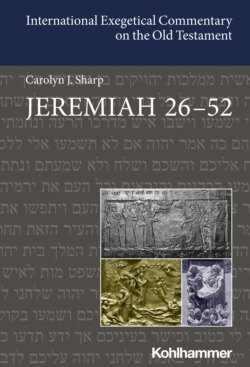Читать книгу Jeremiah 26-52 - Carolyn Sharp - Страница 27
На сайте Литреса книга снята с продажи.
Subaltern hope interrupts imperial domination
ОглавлениеHope is radical. In the words of liberation theologian Jon Sobrino, hope can utter “words of humanity in the midst of inhumanity,” restoring the dignity of the poor, the oppressed, and the traumatized.178 For those who are in positions of subjugation to express hope counts as a daring act of resistance, because it claims a future that is envisioned to be counter to the present oppressive reality. Hope as an interruption of imperialismExpressions of hope, including promises of change and celebrations of new possibility, not only bolster those living under oppression. They “interrupt” the apparent inevitability of imperial domination and the inescapability of its effects. As the reader journeys through Jer 26–52, numerous sites of hope may be discerned, even if some of those sites may seem unstable or compromised. These are terrains in which resilience is evident and new flourishing may be glimpsed, revealed to the reader through words spoken by the prophet, gestures of alliance and resistance enacted by characters in the plot, and images of God’s power and enemies’ vulnerability as envisioned in oracles of restoration for Judah and oracles of doom against Judah’s oppressors. Such sites of hope include the oracles of healing and restoration in chs. 30–31, Jeremiah’s bold buying of land in ch. 32, the reconstituting of the indestructible prophetic scroll in ch. 36, Ebed-melech’s rescue of Jeremiah from the cistern in ch. 38, and—for many readers, though this pacifist quails at the thought—the divine punishment to be leveled against other nations in chs. 46–51. These moments of prose narrative and poetic creativity constitute scribal gestures of endurance, resistance, and hope for the traumatized community—gestures that may be taken to interrupt the narrative of Babylonia’s domination.
We may claim hope also in our very perception of a fluid interplay among compliance, complicity, and contention in these ancient texts. Within a postcolonial framework, R. S. Sugirtharajah illumines the ways in which processes of interpretation themselves can serve purposes of subjugation or emancipation. He writes,
What fundamentalists of all shades want is to simplify narratives and discard any awkward and dissenting voices. This they do by making a particular textual reading representative by winnowing out uncomfortable texts; or by creating an uncomplicated version of history which can serve the political and religious requirements of their narrow cause; or by fixing an imaginative identity freed from often competing and contradictory identities.179
The task of the postcolonial critic, as for the feminist interpreter, is different: we approach these ancient texts with a curiosity that seeks “to identify both the resistance and the collusion narratives embedded in them,” framing these discourses as “a system of codes which interpreters must disentangle in order to reveal the hidden power relations and ideologies lurking in supposedly innocent narratives.”180 Here we can work to decolonize representations of Israel’s covenant with Yhwh, declining theologies based on punitive divine sovereignty enacted against an abjected people. Instead, we can underline Yhwh’s fidelity expressed in an unshakable relational commitment in luminous texts as 31:20, 31:37, and 32:37–41. We can also look beyond Jeremiah for counter-texts. Two possibilities are Hos 11:9, “I am God and no mortal, the Holy One in your midst, and I will not come in wrath,” which dethrones the notion of a deity characteristically given to retribution, and Isa 19:24–25, which names Egypt and Assyria as blessed and beloved along with Israel, thereby dismantling militarized aggression as an inadequate framework for geopolitical relations.181 In this work of decolonizing covenant—which is communal work responsive to the lived needs of real people and groups—we may find hope even in the entanglements of text and counter-text within Jeremiah. That is: it may constitute a cause for hope that the traditions attributed to Jeremiah are so complex and contestatory. Bolstered by this possibility, even claiming it as authorization for ongoing dialogue and fruitful disputation in interpretation, we may dare to move forward into Jer 26–52.
